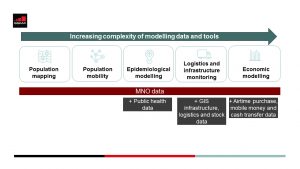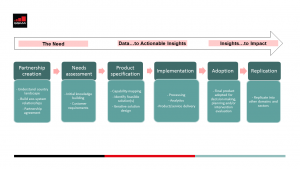Following regulatory approvals in several countries, we start the New Year with positive progress regarding COVID-19 vaccine deployment. However, it will still be some time before the majority of people will be able to receive and therefore fully benefit from the protection they can provide. Furthermore, in some regions, vaccine availability and access may be limited. Consequently, for many the spectre of COVID-19 continues, and mobile big data (MBD) analytics remains a relevant tool to enhance ongoing management of the response and economic recovery efforts.
Since the pandemic began, the GSMA AI4I initiative has been monitoring MNOs’ activity, with a focus on the application of MBD analytics, seeking to understand where and how they are working with governments to identify lessons learned. To date, we have captured 40 countries where MBD analytics work has been or is currently ongoing. Many of these were rapidly activated following the initial outbreak, but as the COVID-19 pandemic evolves, so do the use case applications.

Government measures have focused on reducing movement and mixing of the population to suppress transmission or ‘flatten the curve’ of case numbers in the population, to avoid overwhelming public health systems. There were also measures to provide economic support for the hardest hit individuals and businesses, and to ensure the adequate supply of equipment and personnel in disease hotspots, just to name a few.
How are COVID-19 use cases evolving?
Following the impact of the pandemic, governments are introducing measures to avoid new spikes in infection rates; preparing health systems for future disease outbreaks and building new infrastructure. They are also reallocating public services and logistics to cope with changes in usage patterns and behaviours and taking advantage of new opportunities to shape a more sustainable and resilient economy.
Understanding the characteristics and mobility patterns of a population is essential in delivering an effective and proportional implementation of current and future measures. This is particularly important in low-income countries where lockdown can limit economic opportunities for poorer people, potentially leading to an increase in hunger, deprivation, and related mortality. The Africa Joint Continental Strategy for Covid-19 Outbreak highlights the need to promote evidence-based public health practice for surveillance, prevention, and control of COVID-19.
How are LMIC governments able to increase their capacity and capability to respond?
With support from the UK’s Foreign, Commonwealth and Development Office (FCDO), AI4I spearheaded collaborations between mobile operators and governments in LMICs to implement MBD analytics and AI decision-making tools to support COVID-19 response and recovery. To achieve this, AI4I opened in-country collaborations between multiple demand and supply side partners, leading implementations in the DRC, Benin, Burkina Faso, and Rwanda alongside providing support to requests from numerous other countries.
The AI4I approach follows a set of progressively complex use cases, starting from population and mobility insights to advanced analytical tools that leverage epidemiological, logistical, infrastructure and economic vulnerability modelling. It is guided by a six-step engagement process designed to facilitate collaboration among local stakeholders and successfully deliver scalable, sustainable and replicable solutions:
The GSMA AI4I Implementation Engagement Process

Education and capacity building of government agencies at each stage is key to realising these objectives. In practice, the process is iterative, with feedback used to refine the preceding steps as the project progresses. Also, in each collaboration, there are unique elements requiring local knowledge of policy and privacy considerations; technical development and adoption methods; sustainability and funding structures; as well as the dynamics between ecosystem stakeholders. Therefore working with local stakeholders and accounting for the individual country context is vitally important when defining the response.
How can I learn more from AI4I’s in country engagement?
For each of the unique elements the AI4I Webinar Series, ‘Using Mobile Big Data Analytics to combat challenges including COVID-19’, has shared best practice examples to bring a deeper level of understanding for mobile operators and governments who wish to develop and adopt impactful products and services to aid decision making.
Building on the best practice and theory already shared in the series, the next webinar ‘Mobile Big Data Analytics – From Theory to Application’ will focus on the ongoing in-country activity. Including perspectives from government end users, it will highlight the progress and explore the challenges arising during the development of capabilities, based on AI4I’s mobile data analytics best practice principles.
Featuring guest speaker Angelos Munezero, Public Sector Digitization Analyst from Ministry of ICT & Innovation, Rwanda, to discuss first-hand experience of mobile data analytics capability and capacity development.
Join us for the webinar on Thursday 4th February, using the button below.
This initiative has been funded by UK aid from the UK government and is supported by the GSMA and its members. The views expressed do not necessarily reflect the UK government’s official policies.